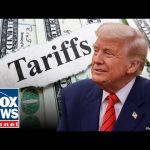President Donald Trump is making bold moves on the international stage, spearheading efforts to broker a historic peace deal between Ukraine and Russia. This initiative comes as the war continues to devastate Eastern Europe, with millions of lives lost and widespread destruction. Trump’s strategy, which includes a proposed 30-day ceasefire already accepted by Ukraine, places the onus on Russia to agree to terms that could pave the way for lasting peace. While critics may question his unconventional approach, Trump’s willingness to engage directly with both Vladimir Putin and Volodymyr Zelensky underscores his commitment to ending what he has called “an absolute killing field.”
This diplomatic push is emblematic of Trump’s broader foreign policy philosophy: achieving results through strength and negotiation rather than endless conflict. Unlike previous administrations that often seemed content with managing crises, Trump has prioritized resolving them. His threat to impose devastating sanctions on Russia if it fails to negotiate in good faith highlights his readiness to use economic leverage as a tool for peace. Critics who claim Trump is too lenient on Putin fail to grasp the delicate balance required to mediate such a complex conflict. By keeping lines of communication open with both sides, Trump is positioning the United States as a decisive force for stability.
Meanwhile, back home, Democrats are floundering in their attempts to address domestic challenges, including the looming government shutdown. Senate Majority Leader Chuck Schumer’s retreat from opposing the GOP’s temporary funding bill reveals a party in disarray, unable to unify around a coherent strategy. While Republicans focus on fiscal responsibility and national security, Democrats appear more concerned with obstructing Trump’s agenda than delivering results for the American people. This lack of leadership has left many Americans questioning whether Democrats are capable of governing effectively during times of crisis.
Amid this political turmoil, the U.S. economy is showing signs of resilience under Trump’s leadership. Inflationary pressures are easing, and American manufacturing is experiencing a significant rebound after years of decline. Projections for 2025 indicate a 4.2% increase in manufacturing revenues, driven by strategic investments and policies that prioritize domestic production. This economic recovery stands in stark contrast to the Democrats’ fixation on divisive social issues, which often seem disconnected from the concerns of everyday Americans.
As Trump works toward peace abroad and prosperity at home, his administration remains focused on core conservative principles: protecting American interests, fostering economic growth, and upholding traditional values. Whether it’s ensuring fairness in women’s sports or reducing wasteful government spending, Trump continues to champion policies that resonate with millions of Americans. In an era marked by political division and global uncertainty, his leadership offers a clear vision for stability and progress—both at home and on the world stage.




